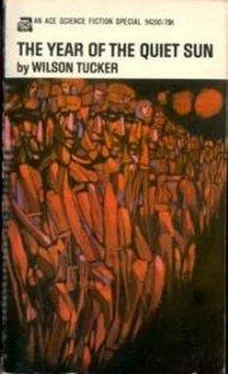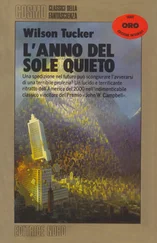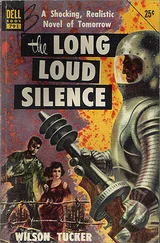Wilson Tucker - The Year of the Quiet Sun
Здесь есть возможность читать онлайн «Wilson Tucker - The Year of the Quiet Sun» весь текст электронной книги совершенно бесплатно (целиком полную версию без сокращений). В некоторых случаях можно слушать аудио, скачать через торрент в формате fb2 и присутствует краткое содержание. Год выпуска: 1970, ISBN: 1970, Издательство: Ace Books, Жанр: Фантастика и фэнтези, на английском языке. Описание произведения, (предисловие) а так же отзывы посетителей доступны на портале библиотеки ЛибКат.
- Название:The Year of the Quiet Sun
- Автор:
- Издательство:Ace Books
- Жанр:
- Год:1970
- ISBN:0-441-94201-6
- Рейтинг книги:3 / 5. Голосов: 1
-
Избранное:Добавить в избранное
- Отзывы:
-
Ваша оценка:
- 60
- 1
- 2
- 3
- 4
- 5
The Year of the Quiet Sun: краткое содержание, описание и аннотация
Предлагаем к чтению аннотацию, описание, краткое содержание или предисловие (зависит от того, что написал сам автор книги «The Year of the Quiet Sun»). Если вы не нашли необходимую информацию о книге — напишите в комментариях, мы постараемся отыскать её.
Won retrospective John W. Campbell Memorial Award in 1976.
Nominated for Nebula Award for Best Novel in 1970.
Nominated for Hugo Award for Best Novel in 1971.
The Year of the Quiet Sun — читать онлайн бесплатно полную книгу (весь текст) целиком
Ниже представлен текст книги, разбитый по страницам. Система сохранения места последней прочитанной страницы, позволяет с удобством читать онлайн бесплатно книгу «The Year of the Quiet Sun», без необходимости каждый раз заново искать на чём Вы остановились. Поставьте закладку, и сможете в любой момент перейти на страницу, на которой закончили чтение.
Интервал:
Закладка:
He said: “So ends the bloody business of the day.”
EIGHTEEN
Katrina peered across the table and sought to break the unhappy silence between them.
“A family, you said? Father, mother, and child? A healthy child? How old was he?”
“I don’t know: three, maybe four. The kid was having himself a fine time — playing, hollering, picking up things — until I scared off his parents.” Chaney still felt bitter about that encounter. “They all looked healthy enough. They ran healthy.”
Katrina nodded her satisfaction. “It gives one hope for the future, doesn’t it?”
“I suppose so.”
She reprimanded him: “You know so. If those people were healthy, they were eating well and living in some degree of safety. If the man carried no weapon, he thought none was needed. If they had a child and were together, family life has been re-established. And if that child survived his birth and was thriving, it suggests a quiet normalcy has returned to the world, a measure of sanity. All that gives me hope for the future.”
“A quiet normalcy,” he repeated. “The sun in that sky was quiet. It was cold out there.”
The dark eyes peered at him. “Have you ever admitted to yourself that you could be wrong, Brian? Have you even thought of your translations today? You were a stubborn man; you came close to mocking Major Moresby.”
Chaney failed to answer: it was not easy to reassess the Eschatos scroll in a day. A piece of his mind insisted that ancient Hebrew fiction was only fiction.
They sat in the heavy silence of the briefing room, looking at each other in the lantern light and knowing this was coming to an end. Chaney was uneasy. There had been a hundred — a thousand — questions he’d wanted to ask when he first walked into the room, when he first discovered her, but now he could think of little to say. Here was Katrina, the once youthful, radiant Katrina of the swimming pool — and outside was Katrina’s family waiting for him to leave.
He wanted desperately to ask one more question but at the same time he was afraid to ask: what happened to him after his return, after the completion of the probe? What had happened to him? He wanted to know where he had gone, what he had done, how he had survived the perilous years — he wanted to know if he had survived those years. Chaney was long convinced that he was not on station in 1980, not there at the time of the field trials, but where was he then? She might have some knowledge of him after he’d finished the mission and left; she might have kept .in touch. He was afraid to ask. Pindar’s advice stopped his tongue.
He got up suddenly from his chair. “Katrina, will you walk downstairs with me?”
She gave him a strange look, an almost frightened look, but said: “Yes, sir.”
Katrina left her chair and came around the table to him. Age had slowed her graceful walk and he was acutely distressed to see her move with difficulty. Chaney picked up a lantern, and offered her his free arm. He felt a flush of excitement as she neared him, touched him.
They descended the stairs without speaking. Chaney slowed his pace to accommodate her and they went down slowly, one cautious step at a time. Kathryn van Hise held on to the rail and moved with the hesitant pace of the aged.
They stopped at the opened door to the operations room. Chaney held the lantern high to inspect the vehicle: the hatch was open and the hull of the craft covered by dust; the concrete cradle seemed dirty with age.
He asked suddenly: “How much did I report, Katrina? Did I tell them about you? Your family? Did I tell them about that family on the railroad tracks? What did I say?”
“Nothing.” She wouldn’t look up at him.
“What?”
“You reported nothing.”
He thought her voice was strained. “I had to say something. Gilbert Seabrooke will demand something .”
“Brian—” She stopped, swallowed hard, and then began again. “You reported nothing, Mr. Chaney. You did not return from your probe. We knew you were lost to us when the vehicle failed to return at sixty-one seconds: you were wholly lost to us.”
Brian Chaney very carefully put the lantern down and then turned her around and pulled her head up. He wanted to see her face, wanted to see why she was lying. Her eyes were wet with threatened tears but there was no lie there.
Stiffly: “Why not, Katrina?”
“We have no power, Mr. Chaney. The vehicle is helpless, immobile.”
Chaney swung his head to stare at the TDV and as quickly swung back to the woman. He wasn’t aware that he was holding her in a painful grip.
“The engineers can pull me back.”
“No. They can do nothing for you: they lost you when that device stopped tracking, when the computer went silent, when the power failed here and you overshot the failure date. They lost you; they lost the vehicle.” She pulled away from his hard grasp, and her wavering gaze fell. “You didn’t come back to the laboratory, Mr. Chaney. No one saw you again after the launch; no one saw you again until you appeared here, today.”
Almost shouting: “Stop calling me Mr. Chaney!”
“I am… I am terribly sorry. You were as lost to us as Major Moresby. We thought…”
He turned his back on the woman and deliberately walked into the operations room. Brian Chaney climbed up on the polywater tank and thrust a leg through the open hatch of the TDV. He didn’t bother to undress or remove the heavy boots. Wriggling downward through the hatch, he slammed it shut over his head and looked for the blinking green light. There was none. Chaney stretched out full length on the web sling and thrust his heels against the kickbar at the bottom. No red light answered him.
He knew panic.
He fought against that and waited for his nerves to rest, waited for a stolid placidity to return. The memory of his first test came back: he’d thought then the vehicle was like a cramped tomb, and he thought so now. Lying on the webbed sling for the first time — and waiting for something spectacular to happen — he had felt an ache in his legs and had stretched them out to relieve the ache. His feet had struck the kickbar, sending him back to the beginning before the engineers were ready; they had been angry with him. And an hour later, in the lecture room, everyone heard and saw the results of his act: the vehicle kicked backward as he thrust out his feet, the sound struck his eardrums and the lights dimmed. The astonished engineers left the room on the run, and Gilbert Seabrooke proposed a new study program to be submitted to Indic. The TDV sucked power from its present, not its past.
Chaney reached up to snug the hatch. It was snug. The light that should have been blinking green stayed dark. Chaney jut the heavy boots against the bar and pushed. The red light stayed dark. He pushed again, then kicked at the bar. After a moment he twisted around to peer through the plastic bubble into the room. It was dimly lit by the lantern resting on the floor.
He shouted: “Goddammit, go!” And kicked again.
The room was dimly lit by lantern light.
He walked slowly along the corridor in the feeble light of the lantern, walked woodenly in shock tinged with fear. The failure of the vehicle to move under his prodding had stunned him. He wished desperately for Katrina, wished she was standing by with a word or a gesture he might seize for a crutch, but she wasn’t visible in the corridor. She had left him while he struggled with the vehicle, perhaps to return to the briefing room, perhaps to go outside, perhaps to retire to whatever sort of shelter she shared with her son and daughter. He was alone, fighting panic. The door to the engineering laboratory was standing open, as was the door to the storeroom, but she wasn’t waiting for him in either place. Chaney listened for her but heard nothing, and went on after the smallest pause. The dusty corridor ended and a flight of stairs led upward to the operations exit.
Читать дальшеИнтервал:
Закладка:
Похожие книги на «The Year of the Quiet Sun»
Представляем Вашему вниманию похожие книги на «The Year of the Quiet Sun» списком для выбора. Мы отобрали схожую по названию и смыслу литературу в надежде предоставить читателям больше вариантов отыскать новые, интересные, ещё непрочитанные произведения.
Обсуждение, отзывы о книге «The Year of the Quiet Sun» и просто собственные мнения читателей. Оставьте ваши комментарии, напишите, что Вы думаете о произведении, его смысле или главных героях. Укажите что конкретно понравилось, а что нет, и почему Вы так считаете.












